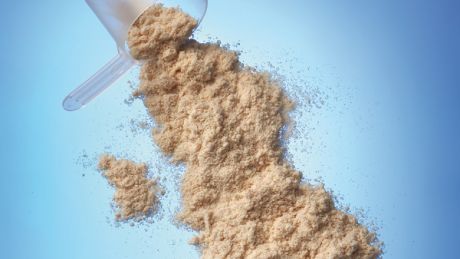What's in the protein I'm taking?
Protein is an important part of your diet, but what does it actually do?

What is it? Protein makes up part of the structure of every cell and tissue in your body, and makes up an average of 20 per cent of your bodyweight. It's needed to form new tissue as well as body enzymes and various hormones.
What does it do? Protein is broken down for fuel during exercise, so you need a concentrated source of it to supplement your usual intake. Protein supplements should ideally also contain high levels of essential amino acids, which are readily digested, absorbed and retained by the body for muscle repair.
Who should take it? All athletes need to compensate for increased breakdown of protein during training, while strength athletes need extra to provide the stimulus for muscle growth.
How much should I take? The Food Standards Authority recommends a daily intake of 55g of protein for adults, but most dieticians agree that isn't enough for anyone training regularly. The International Olympic Committee recommends around 1.2-1.4g of protein per kg of bodyweight a day for endurance athletes or 1.4-1.7g per kg for strength and power athletes. Gregg Marsh suggests the following approach: 'If you're lean - have less than 10 per cent body fat - then try to have a post-workout shake with 0.6g of protein and 1.2g of carbs per kilo of lean body weight (LBM). So an 80kg man would need roughly 43.2g of protein and 98.4g of carbs. If you're above 10 per cent body fat then the formula is the same as above, but with L-glycine and L-glutamine in place of the carbs.'
Dr Lonnie Lowery sees no problem with overfeeding protein for serious athletes. 'I think there are real body composition advantages to eating upwards of 3g per kg every day. Overeating protein, within reason, will not make you fat. You'll piss away a good deal of it, but so what? It won't hurt you unless you've got kidney disease and you'll have the assurance that your gym work is getting the required nutritional support.'
When should I take it? The most important thing is to make sure you get some protein early in the post-exercise recovery phase, ideally in the first hour after exercise. 'I'm a fan of eating two meals of 50g of protein plus 50g of carbs at 30 and 90 minutes post-training,' says Lowery. 'The rest of the day I limit carbs to fibrous grains, fruits and vegetables, but I try to get four more meals in of 30-50g of protein each. These can be protein from meat and eggs, or shakes.'
Does it have any side effects? 'It used to be thought that excess protein could place excess stress on the liver or kidneys,' says Anita Bean. 'But this has never been demonstrated on healthy people, only ones already suffering from kidney failure.' A high protein intake can potentially cause dehydration - so make sure you're drinking plenty of water - but other than that it won't do you any harm.
Click on the links below to find out all you could possibly want to know about the other major supplements:
Protein
Creatine
Amino acids
Antioxidants
Fat burners
Lesser known supplements
Supplement FAQs
Extra info
We consulted these experts to get the inside track on protein:
Anita Bean
is the author of The Complete Guide To Sports Nutrition (£15.99, A&C Black Publishers). For more visit anitabean.co.uk.
Get the Coach Newsletter
Sign up for workout ideas, training advice, reviews of the latest gear and more.
Dr. Lonnie Lowery
is an exercise physiologist, nutrition expert and former competitive bodybuilder. He is also a licensed dietician specialising in sports nutrition.
Nikhil Rao
is a trainee doctor, avid weightlifter and regular contributor to the US bodybuilding site t-nation.com. He has been using creatine for six years.
Gregg Marsh
is a strength and conditioning coach, personal trainer and nutrition consultant. He has more than eight years of experience in nutrition. For more visit fitleanandhealthy.com.
Coach is a health and fitness title. This byline is used for posting sponsored content, book extracts and the like. It is also used as a placeholder for articles published a long time ago when the original author is unclear. You can find out more about this publication and find the contact details of the editorial team on the About Us page.

